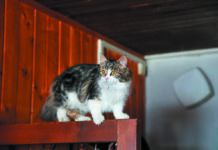

Human psychopaths, according to one model, are said to have three distinct traits:
Disinhibition, which reflects a problem with impulse control.
Boldness, an outlook where social dominance aligns with a lack of compassion for others and a willingness to tread into situations that are risky or dangerous.
Meanness, specifically, aggressive seeking of resources without regard for others.
Are there house cats who could also have these traits?
Evolutionarily, it makes sense. These features of mammals’ brains probably served a useful purpose at one time. Prehistorically, it no doubt took some disinhibition for people to deal with a saber-toothed tiger; some boldness to hunt a dangerous animal for its meat; and some meanness to jockey for, say, access to fertile women and the shadiest spot on the savanna. Ditto for cats, who at one time needed to pounce on prey in order to survive and engage in other antisocial actions that ensured their health and safety as well as fulfilled their biological impulse to pass on their genes.
But can it really be said that cats have psychopathic impulses, with some cats displaying a greater share than others? That’s what researchers at both the UK’s University of Liverpool and Liverpool John Moores University wanted to find out. They sought to learn, too, whether the evolutionary pressures that caused psychopathic traits to develop in cats in the first place now get in the way of good relationships between pet cats who live in houses and the people who take care of them. With those goals in mind, they conducted a series of studies in which they asked dozens of questions of thousands of cat owners, culling some pretty provocative answers in the process.
Identifying feline psychopathy
The investigators, reporting in the Journal of Research in Personality, found first of all that yes, to varying degrees cats can and do display the same psychopathic traits of disinhibition, boldness, and meanness that people do. For instance, bold cats torment their prey and climb very high while mean ones regularly steal food, play aggressively with people, and blithely disobey house rules.
But the researchers also identified two other traits of cat psychopathy: pet-unfriendliness and human-unfriendliness. Cats who are pet-unfriendly act aggressively both toward other pet cats and non-cat pets including dogs, while human-unfriendly cats are aggressive toward children and new people, do not enjoy being petted, and purr when attacking people.
Implications for the cat-human bond
Interestingly, not all five of the psychopathic traits identified for cats predict a poor relationship with people. While boldness and meanness correlate with a poor rapport between cats and their owners, the psychopathic traits of disinhibition and pet-unfriendliness apparently bode well for how well cats and their owners get on. It’s not surprising when you consider that disinhibition correlates with cats who want to be near their owners, demand attention, and exhibit curiosity and high sociability with people. Such cats are found to be agreeable. They also are more likely to walk or sit on items their owners are using, but that is not something that in the end seems to make people feel annoyed. Perhaps it even endears cat owners to their pets.
As for pet-unfriendliness predicting a higher-quality relationship with people, the researchers say that finding was “unexpected.” It may be, they posit, that people who choose to have more than one pet (and thus provide the environment where pet-unfriendliness could occur) are more animal-oriented to begin with and therefore more likely to report high-quality bonding with their pets. It may also be that people whose cats prefer them to other pets in the house like being their feline’s favorite housemate; they enjoy that status.
Matching the right cat with the right household
The researchers point out that a leading cause of death for house cats is euthanasia because the cats are unwanted. They are too aggressive or too disobedient — qualities of “psychopathic” pets. They are also more likely to be the victims of physical punishment by their owners. That’s why it’s so important to understand feline psychopathy, they say, and make every effort to pair the right cat with the right household.
For instance, a cat who scores particularly high on the quality of boldness might benefit from someone who is willing to have large cat trees and tall scratching posts, as such cats often enjoy exploring and climbing. Providing such outlets may reduce their undesirable behaviors toward people and other pets, the researchers say. Likewise, a cat who gets a high score on pet-unfriendliness while at the shelter might benefit from being adopted by someone who has no other pets. And cats who are pet-friendly but people-unfriendly might do well in a home where the people are out much of the time but there are other animals to keep them company.
At the very least, understanding that cats come with psychopathic traits that are vestiges of behaviors once necessary for their survival can help owners be more patient when their pets don’t behave the way they would like. As lead researcher Rebecca Evans, BSc, MSc, puts it, “We believe that, like any other personality trait, psychopathy is on a continuum, where some cats will score more highly than others. We hope that our study can help owners to understand their feline friends better and offer insights to improving the cat-owner relationship.”



